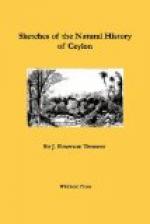On ascending the steep bank of the second stream, we found ourselves in front of the residences which had been extemporised for our party in the immediate vicinity of the corral. These cool and enjoyable structures were formed of branches and thatched with palm leaves and fragrant lemon grass; and in addition to a dining-room and suites of bedrooms fitted with tent furniture, they included kitchens, stables, and storerooms, all run up by the natives in the course of a few days.
In former times, the work connected with these elephant hunts was performed by the “forced labour” of the natives, as part of that feudal service which under the name of Raja-kariya was extorted from the Singhalese during the rule of their native sovereigns. This system was continued by the Portuguese and Dutch, and prevailed under the British Government till its abolition by the Earl of Ripon in 1832. Under it from fifteen hundred to two thousand men superintended by their headmen, used to be occupied, in constructing the corral, collecting the elephants, maintaining the cordon of watch-fires and watchers, and conducting all the laborious operations of the capture. Since the abolition of Raja-kariya, however, no difficulty has been found in obtaining the voluntary co-operation of the natives on these exciting occasions. The government defrays the expense of that portion of the preparations which involves actual cost,—for the skilled labour expended in the erection of the corral and its appurtenances, and the providing of spears, ropes, arms, flutes, drums, gunpowder, and other necessaries for the occasion.
The period of the year selected is that which least interferes with the cultivation of the rice-lands (in the interval between seed time and harvest), and the people themselves, in addition to the excitement and enjoyment of the sport, have a personal interest in reducing the number of elephants, which inflict serious injury on their gardens and growing crops. For a similar reason the priests encourage the practice, because the elephants destroy their sacred Bo-trees, of the leaves of which they are passionately fond; besides which it promotes the facility for obtaining elephants for the processions of the temples: and the Rata-mahat-mayas and headmen have a pride in exhibiting the number of retainers who follow them to the field, and the performances of the tame elephants which they lend for the business of the corral. Thus vast numbers of the peasantry are voluntarily occupied for many weeks in putting up the stockades, cutting paths through the jungle, and relieving the beaters who are engaged in surrounding and driving in the elephants.
In selecting the scene for the hunt a position is chosen which lies on some old and frequented route of the animals, in their periodical migrations in search of forage and water; and the vicinity of a stream is indispensable, not only for the supply of the elephants during the time spent in inducing them to approach the enclosure, but to enable them to bathe and cool themselves throughout the process of training after capture.




